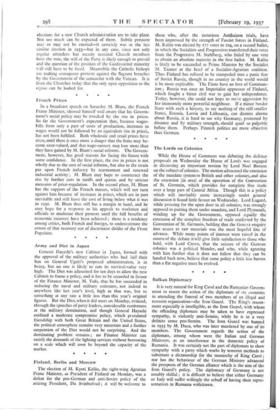Finland, Berlin and Moscow The election of M. Kyoti Kallio,
the right-wing Agrarian Prime Minister, as President of Finland on Monday, was a defeat for the pro-German and anti-Soviet policy of the retiring President, Du Svinhufvud ; it will be welcome to those who, after the notorious Antlainen trials, have been impressed by the strength of Fascist forces in Finland. M. Kallio was elected by 177 votes to 1o4, on a second ballot, in which the Socialists and Progressives transferred their votes from the Progressive M. Stahlberg, who failed by one vote to obtain an absolute majority in the first ballot. M. Kallio is likely to be succeeded as Prime Minister by the Socialist M. Tanner at the head of a Socialist-Agrarian coalition. Thus Finland has refused to be stampeded into a panic fear of Soviet Russia, though in no country in the world would it be more explicable. The Finns have no love of Commun- ism; Russia was once an Imperialist oppressor of Finland, which fought a bitter civil war to gain her independence. Today, however, she could not hope to res;3t aggression by her immensely more powerful neighbour. If a minor border State with such a history, to say nothing of the still smaller States, Estonia, Latvia and Lithuania, can dismiss alarms about Russia, it is hard to see why Germany, protected by distance and by military strength, should quail so palpably before them. Perhaps Finnish politics are more objective than German.














































 Previous page
Previous page